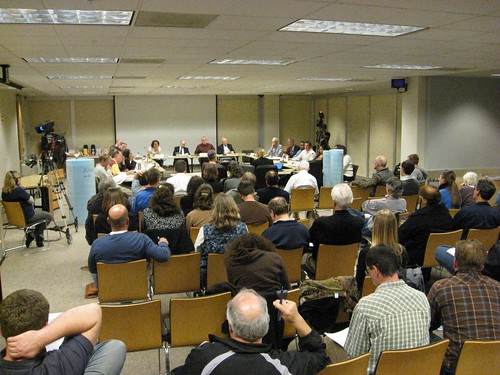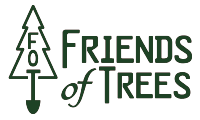Citywide Tree Project to be revisited on March 9

On February 2, nearly a hundred people spoke out about proposed reforms to Portland’s city tree policies (the Citywide Tree Project): 43 testified before City Council and 55 wrote letters. City Council will address concerns raised at the meeting during another public meeting on March 9 at 2 p.m.
Despite Portlanders’ obvious passion for trees—City Commissioner Amanda Fritz commented on how great it was “to see both chambers filled” on February 2—reforming city policies is clearly taking time.
Reforms were first recommended by concerned citizens in southwest Portland more than five years ago. And last year, Portland’s Urban Forestry Commission and the Portland Planning Commission (now the Portland Planning & Sustainability Commission) held a series of public hearings on the reforms before unanimously approving the recommendations discussed on February 2.
Key points of the proposal include consolidating and simplifying city tree codes, providing more education and outreach about the value of planting and caring for city trees, and establishing regulations that provide more protection for existing trees.
The benefits
People who testified at this month’s meeting came from across Portland. They included homeowners, city planners, developers, and representatives from numerous city commissions, bureaus, and watershed councils. Among them were representatives from Metro, Portland Fire & Rescue, the Urban Green Spaces Institute, Audubon Society of Portland, East Multnomah Soil & Water Conservation District, and Friends of Trees.

At the meeting, Roberta Jortner of Portland’s Bureau of Environmental Services, one of the staff members who spearheaded the Citywide Tree Project, said it was important to recognize trees as a “citywide asset” providing almost $40 million in benefits a year.
Mike Rosen, manager of the Watershed Division of Portland’s Bureau of Environmental Services, noted that trees clean our air, cool our homes, provide habitat, cool and retain stormwater runoff, and protect pipe infrastructure. “Urban tree canopy is rapidly emerging to be one of our most important and productive infrastructure assets,” he said.
Friends of Trees

What Portland has done to improve our urban natural areas in the last 20 years, said Friends of Trees board member Fred Nilsen, the city needs to do for our “built environment.”
Nilsen has lived in the Richmond neighborhood for 34 years, worked for Portland Parks & Recreation for 30 years, and managed Hoyt Arboretum for 22 of those 30 years.
About Friends of Trees, he said, “I truly believe in its mission. … It both addresses the need for trees and it involves hundreds of citizens and community volunteers.”
Friends of Trees Executive Director Scott Fogarty was among the stakeholders who worked on the Citywide Tree Project for the past three and a half years.
“Dramatic increases in tree planting efforts over the past decade are undermined by lack of protection and mitigation requirements for trees on much of our landscape, confusing and sometimes contradictory regulations, lack of education outreach resources, and insufficient enforcement capabilities,” he stated in written testimony.
The challenges
One Portland resident told City Council about her attempts on a Sunday morning to stop the removal of many trees across from her home, including an 18-inch Douglas-fir. In the end, though the builder who cut the trees had not obtained the required permits to cut down the trees, he was only fined $500.
“It’s time to put our money where our mouth is,” said Nancy Seton, chair of the Southwest Hills Residential League Neighborhood Association’s Land Use/Planning Committee. “Without healthy, mature trees, we could be sliding down the hill into Goose Hollow or onto Highway 26.”
A good deal of controversy centered on whether Ladd’s Addition should be allowed an exception to the city’s restrictions on planting Norway Maples, which produce numerous seeds that travel many miles and threaten native species in natural areas. In addition, Norway Maples are susceptible to verticillium wilt, which is retained in the soil after a diseased tree has been removed and can infect new Norway Maples planted in the same location.
The February City Council meeting concluded with a call for delegates from the city’s Bureau of Environmental Services, Bureau of Development Services, Bureau of Planning & Sustainability, Portland Parks & Recreation, and a bureau overseen by Commissioner Fritz to review the testimony, proposed amendments, and input from city commissioners. The delegates will document the points they agree on as well as their points of disagreement, providing pros and cons for each point of disagreement.
What you can do
This city web page provides links to proposed amendments, submitted testimony, and a video of the February 2 City Council meeting. You can also read about a growing awareness across the country of the economic benefits that city trees provide in this Winter 2011 Wilson Quarterly article.
All are encouraged to comment on the Citywide Tree Project before the March 9 meeting. You can mail, fax, or email your comments to:
Council Clerk
1221 SW Fourth Avenue, Room 140
Portland, OR 97204
Fax: 503-823-4571
[email protected]
And, of course, the public is invited to testify on March 9. Most likely the new draft of the tree policy reform proposal will be ready for the City Council’s vote at that time.
–TR
